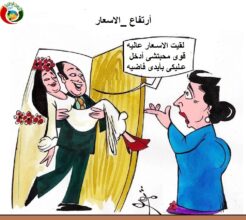The Monetary Policy Committee of the Central Bank of Egypt (CBE) is expected to keep interest levels at its levels during November’s meeting.
This comes amid high rise of inflation rates during October, the continuity of events in emerging markets, and the global of dollar currency, in addition to the postponement of the state’s initial public offering program.
Emerging markets were affected by an exit wave of foreign investments in government debt instruments during the second quarter of 2018 as the US dollar rose, raising fears from the economies of these markets, especially after the crises of Turkey and Argentina.
The acquisition of foreigners in government treasury bills fell to $13.1 billion at the end of September from a record of $21.1 billion in March, head of research at Pharos Radwa el- Swaify told Enterprise.
Egypt had witnessed the exit of $8.4 billion between April and September, she added.
CBE announced earlier that foreign investments in treasury bills declined in July to LE 269.1 billion, compared to LE 299.1 billion in June.
Finance Minister Mohamed Ma’it said that foreign investments in government debt instruments fell to $17.5 billion by the end of June, after reaching $23.1 billion by the end of March.
In the same context, Ministry of Finance cancelled four auctions of treasury bonds after investors asked to raise interest rates.
Egypt targets average interest rates on the government’s debt instrument reaching 14.7 percent in the current budget, compared to an expected average of 18.5 percent in 2017/2018 budget.
“The required return rates were not within logical limits and did not reflect the good economic and financial performance or the improvement of Egypt’s credit rating, but were affected by the risks associated with the emerging markets,” the ministry noted upon the second cancellation.
Inflation
The Central Agency for Public Mobilization and Statistics (CAPMAS) previously announced that the annual inflation rate hit 17.5 percent in October 2018, compared to 31.8 percent in October 2017.
On a monthly basis, the rate increased 2.8 percent, compared to September.
Regarding core inflation, (CBE) said that Egypt’s annual core inflation rate rose to 8.86 percent in October 2018 from 8.55 percent in September 2018, according to a report.
On a monthly basis, core inflation recorded 1 percent in October, compared to 0.1 percent in September.
Core inflation discounts or strips out certain categories that are considered as more volatile.
IPO
Egypt delayed listing some shares of state-owned companies on the Egyptian Exchange, as it should have listed about 4.5 percent of Eastern Company in October.
The government attributed the delay to the global market volatility, noting that if the shares were floated, it would have failed to be covered at proper valuation.
In 2016, Egypt announced the launch of the government’s IPO program to offer shares over three to five years in several state-owned companies in fields such as petroleum, services, chemicals and real estate.
The state’s IPO program comes in light of the economic reform program adopted by Egypt and is conducted under the supervision of the Ministry of Investment.
It targets to offer 15-30 percent of stakes of some state-owned companies on the stock exchange (EGX) to increase the funding to Egyptian companies and maximize the benefit from state assets.
It will also serve as a main tool to attract local and foreign capital flows to Egypt.
Research associations and investment banks
HC Securities & Investment expected that the Monetary Policy Committee (MPC) will keep rates unchanged in the fourth quarter of 2018, with anticipations that inflation will hit 14.8 percent from September to December.
Equity Analyst – Macro & Banking Sector at HC, Monette Doss, said that HC does not expect high interest rates offered by other emerging markets to reflect on higher corridor rates since attracting domestic liquidity is not the main target at the moment.
“The rapid pace of inflation may ease after September when the impact of economic reform measures is fully absorbed. These reform measures are fully reflected in the prices of goods and services,” the report noted.
Banking expert Mohamed Abdel Aal told a local newspaper that the growth of some factors, such as the inflation in October, the decline in the net foreign exchange assets in banking sectors, retaining the attractiveness of the Egyptian currency, and keeping the flow of remittance expatriates, attract foreign investors and face fierce competition from some countries which raised interest rates.
He noted that all these factors should push MPC towards raising interest rates by 100 or 200 basis points but within the pressure of the coordination requirements between monetary policy and finance, where the Ministry of Finance aims to reduce the deficit in the local budget, especially as any increase in interest rates by 1 percent increases the state budget deficit by an average of LE 35 billion.
The banking expert expected MPC to keep interest rates at their levels.
CBE kept interest rates on hold in September for the fourth time this year, setting the overnight deposit rate and the overnight lending rate at 16.75 percent and 17.75 percent, respectively.
During the meetings of August, June and May, MPC also kept the interest rates unchanged after lowering them twice earlier this year by 1 percent each time.
Egypt Today














